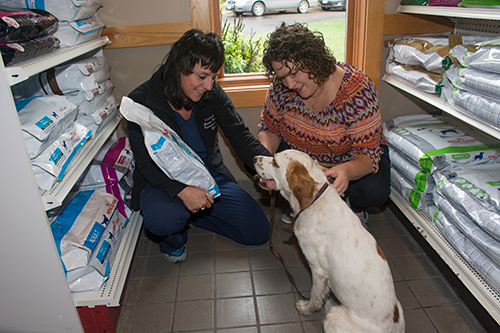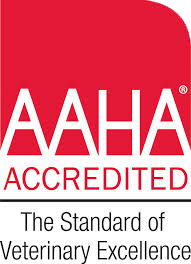Look to Grand Rapids Vet Clinic for Pet Foods, Nutritional Supplements, and Pet Health Products
 Our online store/pharmacy offers full lines of veterinary prescription foods and non-prescription foods for your pet’s specific medical condition and stage of life. We also have nutritional supplements, vitamins, flea control products and dental health products. These products are of the highest quality. Advice regarding their usage is always available. Consult your veterinarian on what kind of food to give your pet. Your pet's nutritional needs change with age, and some medical conditions require special diets. We do carry in-house a selected variety of Hill's Prescription Diets that are used to treat the more common ailments that are diet-responsive in order to help patients started on their treatment right away.
Our online store/pharmacy offers full lines of veterinary prescription foods and non-prescription foods for your pet’s specific medical condition and stage of life. We also have nutritional supplements, vitamins, flea control products and dental health products. These products are of the highest quality. Advice regarding their usage is always available. Consult your veterinarian on what kind of food to give your pet. Your pet's nutritional needs change with age, and some medical conditions require special diets. We do carry in-house a selected variety of Hill's Prescription Diets that are used to treat the more common ailments that are diet-responsive in order to help patients started on their treatment right away.
- Establish mealtimes for your pet. If food is available all day, your pet may eat out of boredom.
- Don't feed your pet table scraps. They are high in fat and calories and can upset the nutritional balance your pet needs.
- Limit food rewards. As much as they love treats, pets also respond well to walks, play time, and just spending time with you.
"Treating" Your Pet Right
Pet owners have always liked to show their animal family a little extra love with the occasional treat, but modern treats have gone way beyond slipping Rover a little turkey under the kitchen table. These days pet owners can visit pet bakeries, buy frozen dog desserts at the grocery store, or make homemade treats from a pet treat cookbook. With all these options, how do you know the right thing to feed your pet?
Click here for a listing of some common treats and the calories they include.
Be sure to pay attention to how many calories you are giving your pet in a day, you may be surprised how quickly the calories add up!
Here is another Calorie Chart of Everyday Foods & Dog Treats
There's nothing wrong with feeding your pet the occasional treat. Small amounts of a tasty treat can be great motivator if you're trying to train your pet, or to positively reinforce good behavior. These kinds of rewards can increase the bond between pets and owners, and some treats can even help your pet stay healthy. Best of all, it can be a lot of fun watching your pet savor a treat he/she really loves.
Treats can cause problems if they aren't given carefully.
Count those calories
One of the most dangerous problems overindulgence in treats can cause is obesity. It's a growing problem for pets as nearly half of all the pets in the United States are overweight. Obesity can contribute to a wide range of health problems, from arthritis to diabetes and heart disease. So be aware that some snacks are packed with calories, and stick with low-cal treats or avoid treats altogether if your pet is overweight.
Stay away from scraps
As much as your cat or pup loves to lurk under the table during dinner, hoping for a few spilled crumbs, you should resist the urge to let her sample your table scraps. Leftover scraps from human food tend to be high in calories and fat and they can easily upset your pet's stomach. Not to mention that your pet could get used to the tastier food form the human table, and become picky, refusing their usual diet. Also, a pet that gets all the table food he/she wants is a lot like a five-year-old that fills up on ice cream before dinner. All the empty calories of table snacks can sate their hunger before they get to their own, nutritionally balanced food, and they can miss out on some of the nutrients they needs to stay healthy. Besides, if you feed your pet from your plate even a few times, you'll most likely end up with a pet that begs constantly at the table, even when you have guests visiting. For the sake of your pet's health and your own sanity, make it a house policy to never share table scraps. It might be best to leave your pet in a different room while you eat, so that no one in the family will be tempted.
Tips for treats:
How to choose the right thing when you want to treat your pet
First off, buy treats made specifically for your kind of pet. Most pet stores now offer treats formulated for all kinds of animals from kittens to cockatiels to ferrets. If your pet eats at scheduled meal times, don't let them fill up on treats before meals.
- Try giving your pet treats that benefit their health. Pet stores now offer dental treats that clean teeth; cat treats that prevent hairballs; treats with added glucosamine/chondroitin for arthritis, omega fatty acids, antioxidants; and more.
- If you're longing to let your dog sample a little human food but don't want to expand her waistline, you can try giving her a few fresh vegetables. Dogs often love veggies like carrots, broccoli, and green beans, which are low in calories and high in vitamins and healthy fiber.
- You'll have to use some care, as some produce that people love can be harmful to dogs. Onions can damage a dog's red blood cells casuing anemia, and grapes and raisins can be toxic.
- In general, don't let treats make up more than 10 percent of your pet's diet.
- As for the gourmet yummies that are now available, use your best judgment when deciding what to give your pet.
If you have any questions about how many and what kinds of treats are right for your pet, ask your veterinarian. Give us a call today at 218-326-0395.

